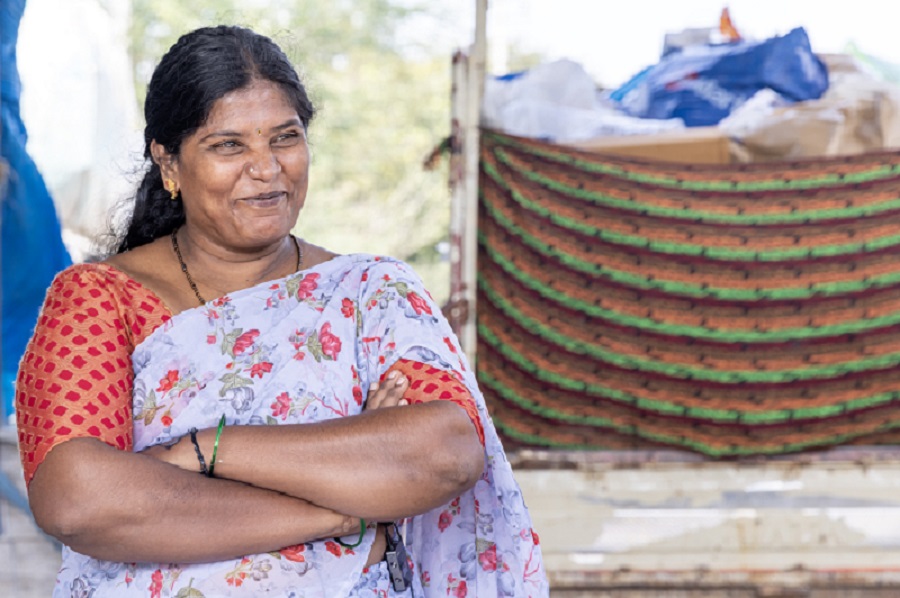As Indumathi, erstwhile wastepicker supported by Hasiru Dala speaks today on behalf of Indian wastepickers at the Intergovernmental Negotiating Committee of the Plastics Treaty, in Uruguay, we spoke to her about her journey. You would be astonished to know the path that lies behind this proud representative of Indian Wastepickers at an international negotiation.
She began working in a garment factory at the age of 12. Her mother had died and her father was back in Ambur, her native, in a second marriage and no income to sustain a child.
There was no education, no certainty of the future and time to rest or play was out of question.
Indumathi got married at 18 and moved to Ambur for a few months. Her husband didn’t have a job and it was a joint family of twenty. She came back to Bangalore to work at the garment factory while her husband kept looking for day jobs. They were plagued with unpredictable incomes, most of the time not knowing where their next meal would come from.
When Indumathi was pregnant with her first child, she had access to the Employee State Insurance Scheme. She recalls her first pregnancy fondly because it was the only time since the age of 12 that she earned money for 88 days without going out for work! One can see the gratitude in her eyes for something as basic as a maternity leave.
Post childbirth, Indumathi and her husband had mounting bills to pay. Their child was born with chronic brain hemorrhages and needed treatments. They had to take loans and life got nastier.
“The more urgent your need, the more interest they charge”, she says, sadly recalling a debt-ridden life.
Soon Indumathi found out she was pregnant again. The second child when born had several medical complications like the first one and couldn’t survive due to lack of healthcare. The next child was born with a heart condition and similarly needed medical treatments. Therefore, the next many years pushed Indumathi and her family into extreme poverty.
She and her husband worked shifts in day and night respectively, with one taking care of the children while the other was gone. Apart from this, she would also do tailoring work at home.
“I could not afford free time. My husband and I used to sleep 2-3 hours a day.”
They would come back home to yelling landlords, a threatening grocer and drunken lenders randomly dropping by at their door to hurl insults. A perpetual threat for survival loomed over as she paraded hospitals & desperately looked for free health camps.
As Indumathi began to look for alternate sources of income, she found out she could earn by picking up and selling waste. From here began her journey as a wastepicker.
“I would go out at 3am. When spotted, people, and often the police would think I’m a thief and yell at me. I had to explain that I was just trying to eke out a living. I would often be asked to leave with a shower of swear words.”
In 2009, depressed with debts that looked perpetual, her husband died by suicide.
Indumathi sighs, “I was disillusioned. Everything had fallen apart. I had two kids to feed and take care of. I had 40 lakhs in debt with no money to put food on the table if I didn’t work for 2 days.”
She worked 4 jobs a day - as a wastepicker early morning, as a sweeper & helper in a scrap shop, the garment factory job by the day and tailoring work in the evening.
In 2015, Meenakshi from Hasiru Dala came by. By now, Indumathi had bonded with the wastepickers. She felt part of the community. And together they were wary of Meenakshi.
“She would come and ask us questions. We would run away, since we couldn’t trust a stranger to be well-intentioned.”
But the ‘weird lady’ kept coming. She would ask about the health and well-being of the people in the community. With a big smile, Indumathi recalls lying to Meenakshi from Hasiru Dala that her children go to school.
The first ray of hope came with recognition of her work as a wastepicker - an occupational identity card issued by the local municipal corporation. Hasiru Dala had been striving to get recognition for wastepickers through BBMP ID cards to integrate them into the mainstream waste management system.
Indumathi was recognised for her work now and with it came the dignity of the work she did. She wasn’t insulted, stopped or called a thief again when she went waste picking.
She trusted Hasiru Dala now. Her children had scholarships to study. She had someone trustworthy to support and to speak for her, to lookout for her children, to find her additional sources of income.
Little did she know that a breakthrough was awaiting her. The following year, through the policy of BBMP owned Dry Waste Collection Centres (DWCC) were to be given exclusively to wastepickers to run, a policy facilitated and advocated by Hasiru Dala, she was allotted the whole of ward 150 in Bangalore for dry waste collection and sorting. She now deployed multiple vehicles for waste collection and scaled up.
In the four years that followed, Indumathi got one more ward under her and she kept expanding her network of wastepickers who worked with her at the centres. On how she learnt to deal with officials she quipped “I would wear heels and extra clothes inside to look tall and well-built whenever the officials came for inspection”, laughing out loud.
In the multiple trainings that followed from Hasiru Dala, Indumathi learnt how to handle her workforce, how to retain her network of informal waste workers, how to save money, how to use a smartphone, how to be a leader in her community, what it meant to be a climate champion and so on. She now employs 88 workers, has diversified her services and is seen as a leader in her community.
As a parting shot, we asked her candidly, “So how is Indumathi as a boss? Is she the strict one or the friendly one?”
“I am no boss. I don’t even know what that means”, she chuckles.
"Photo Credits: Vaishali Bhatia".


